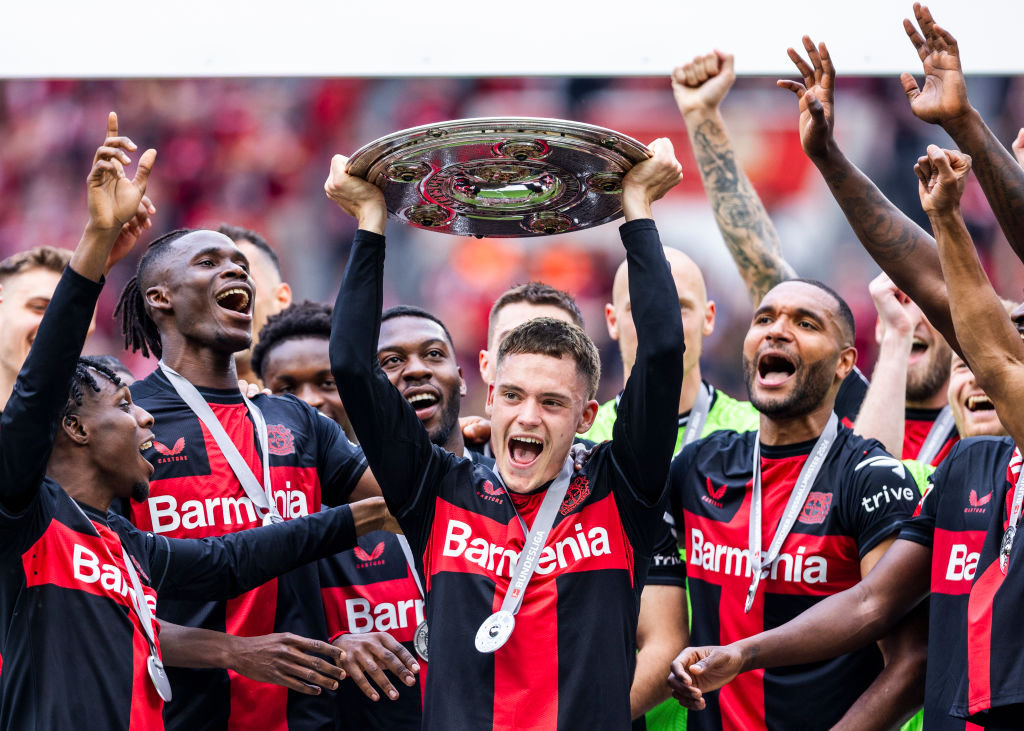
40. Kenny Dalglish
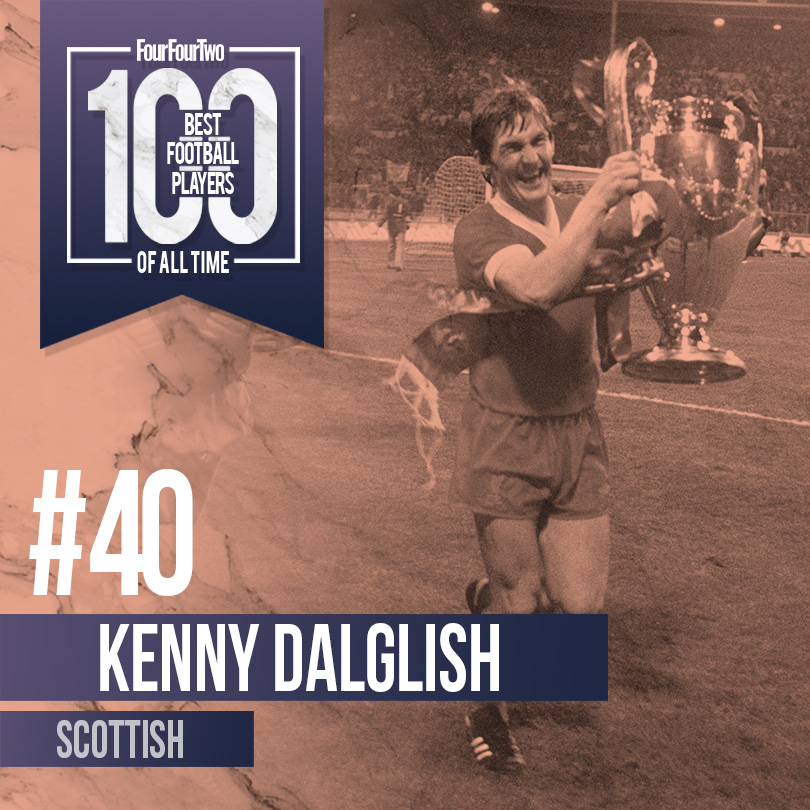
Why are they here?
‘King Kenny’ had already won four Scottish league titles with Celtic before venturing south in 1977 to join Bob Paisley’s Liverpool. He may not have been the quickest, but Paisley noted: “The first yard is in his head,” as he terrorised defences with his guile (and backside), winning a plethora of domestic and European trophies. On top of the team honours, he became the first player to score 100 goals in both the English and Scottish leagues.
Career highlight
Equally adept as a provider and a scorer of goals, Dalglish’s calm chipped effort to win the 1978 European Cup Final against Bruges demonstrated there was no more composed finisher in the game.
Words: Jon Spurling
39. Nandor Hidegkuti
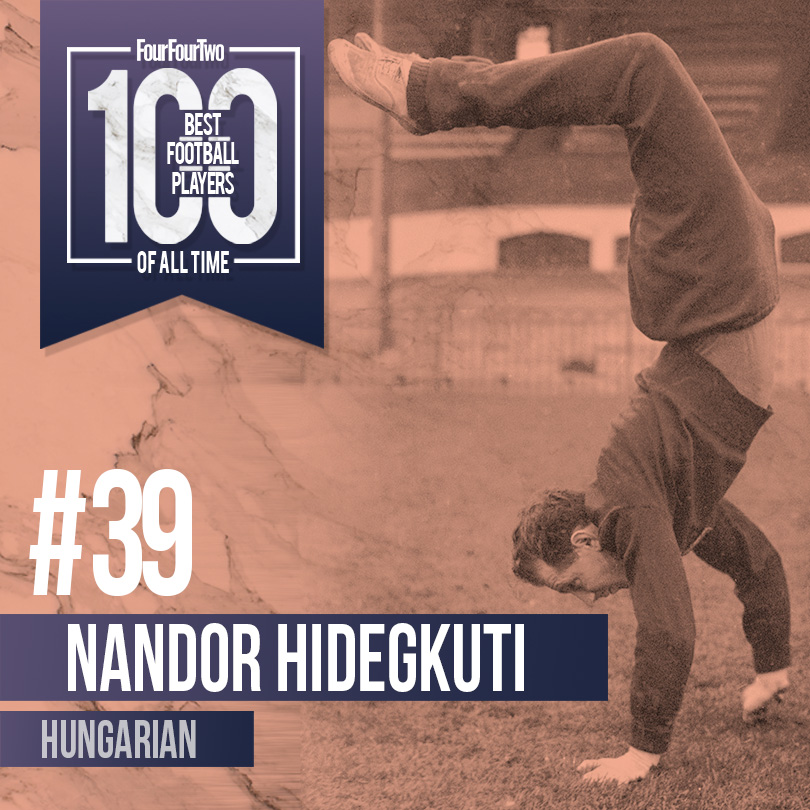
Why are they here?
One of the first ‘false nines’ in history, Hidegkuti was a striker and a playmaker at the same time. He scored at a remarkable rate, but liked to drop deep, organise the game and play delightful through-balls to his team-mates. His vision was second to none, and that made him one of the most influential players for the golden Hungarian team that reached the World Cup final in 1954 and should have lifted the trophy.
Career highlight
Hidegkuti scored within the first minute and went on to complete a hat-trick in the so-called Match of the Century – Hungary's 6-3 win over England at Wembley in November 1953.
The best features, fun and footballing quizzes, straight to your inbox every week.
Words: Michael Yokhin
38. Gianni Rivera
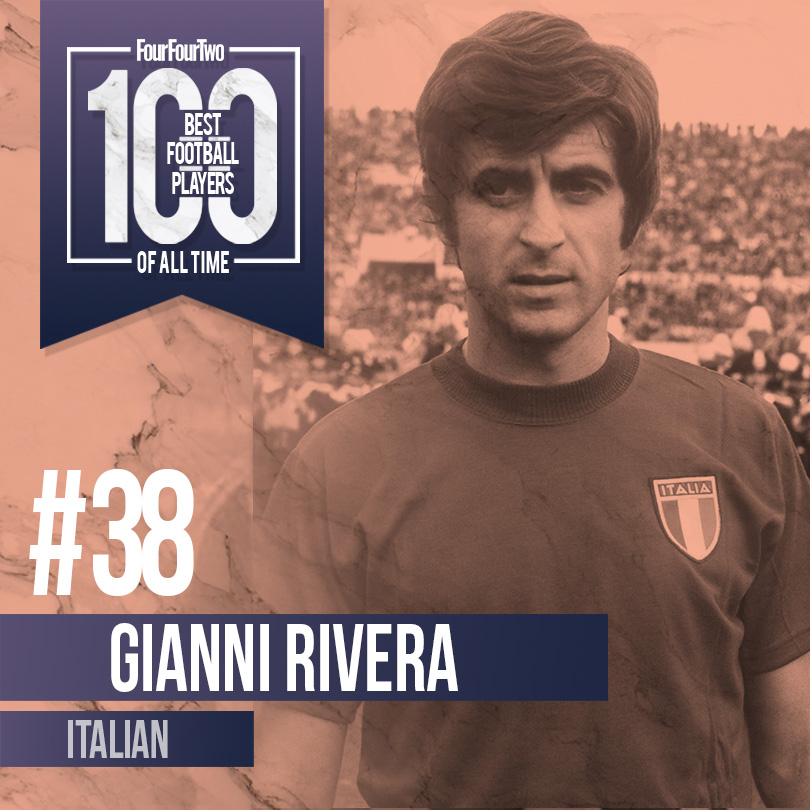
Why are they here?
When asked to name Italy's four best players for the forthcoming 1970 World Cup, the normally taciturn England manager Alf Ramsey joked: "Rivera, Rivera, Rivera, Rivera."
Ramsey's response spoke volumes for the almost evangelical aura that surrounded the Milan star, who racked up an astonishing 501 appearances between 1960 and 1979. Not that he was universally loved in Italy; controversial writer Gianni Brera labelled him abatino (young priest), implying that he was a luxury player with an aversion to physical battles. That didn't prevent a string of Milan managers from building their teams around the luminary talents of 'Golden Boy', however.
Career highlight
"It was as easy for him as if he were serving me tea," gushed Milan striker Jose Altafini, after Rivera had provided him with assists in Milan's triumphant 1963 European Cup Final against Benfica.
Words: Jon Spurling
37. Ruud Gullit
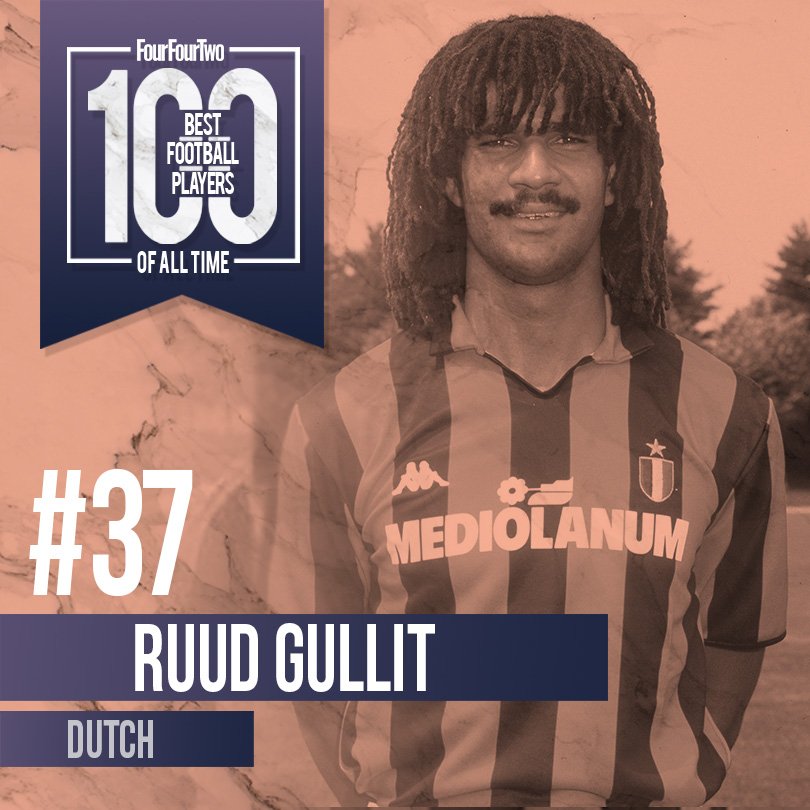
Why are they here?
A footballer of impossible elegance, Gullit’s technical splendour and liberal approach to positional play was the legacy of his famous Dutch predecessors of the 1970s (he played briefly alongside Johan Cruyff in his early years at Feyenoord).
Gullit was a worthy heir, a rare player whose career you look back on and struggle to define his position. At Feyenoord, he began as a sweeper before moving into a midfield playmaking role. At Milan he played on the right of a front three and in the hole. At Chelsea, he was named runner-up in the player of the year awards as a box-to-box midfielder. If the hallmark of Dutch football is versatility, Gullit is as good a poster boy as any.
Career highlight
Starred in Arrigo Sacchi’s epochal 1989 Milan side (scoring in both a 5-0 demolition of Real Madrid and in the 4-0 win over Steaua Bucharest in the European Cup final), but his Ballon d'Or – won two years earlier and dedicated to Nelson Mandela – was his definitive achievement.
Words: Alex Hess
36. Paco Gento
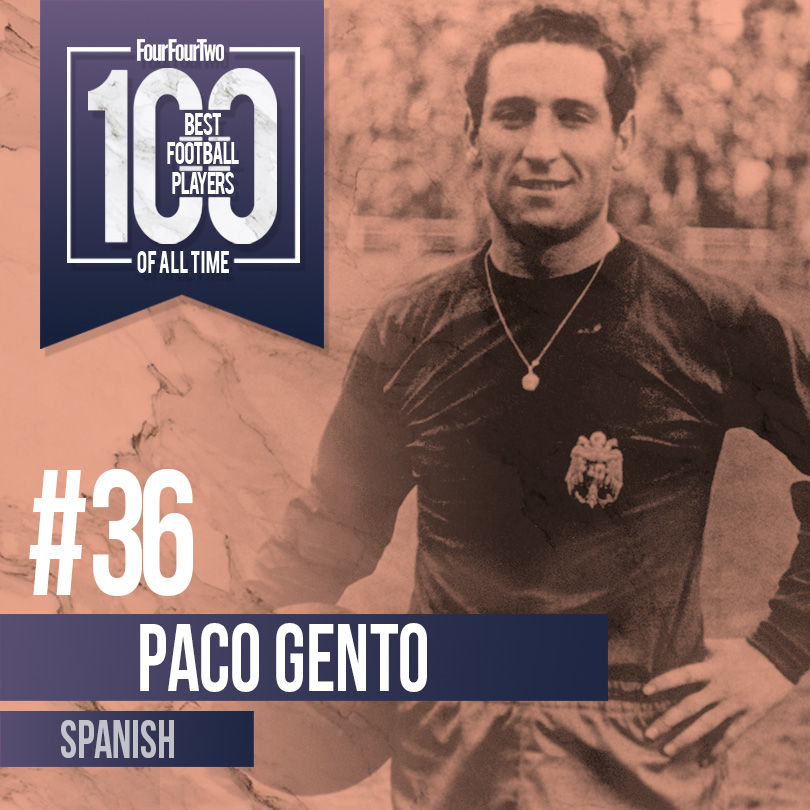
Why are they here?
Outside-left Gento departed Racing Santander and moved to the Bernebeau in 1953. By the time he finally retired in 1971, he’d amassed a barely credible six European Cup winning medals and 12 La Liga titles.
Lightning quick, he also netted copious amounts of goals from midfield, and was usually the conduit between defence and attack as Real Madrid broke forward.
Career highlight
As a veteran he captained Madrid to victory against Partizan Belgrade in the 1966 European Cup Final. Even the normally hostile Catalan paper La Vanguardia gushed: “Paco Gento embodies the old guard, the glory days.”
Words: Jon Spurling
35. Luis Suarez
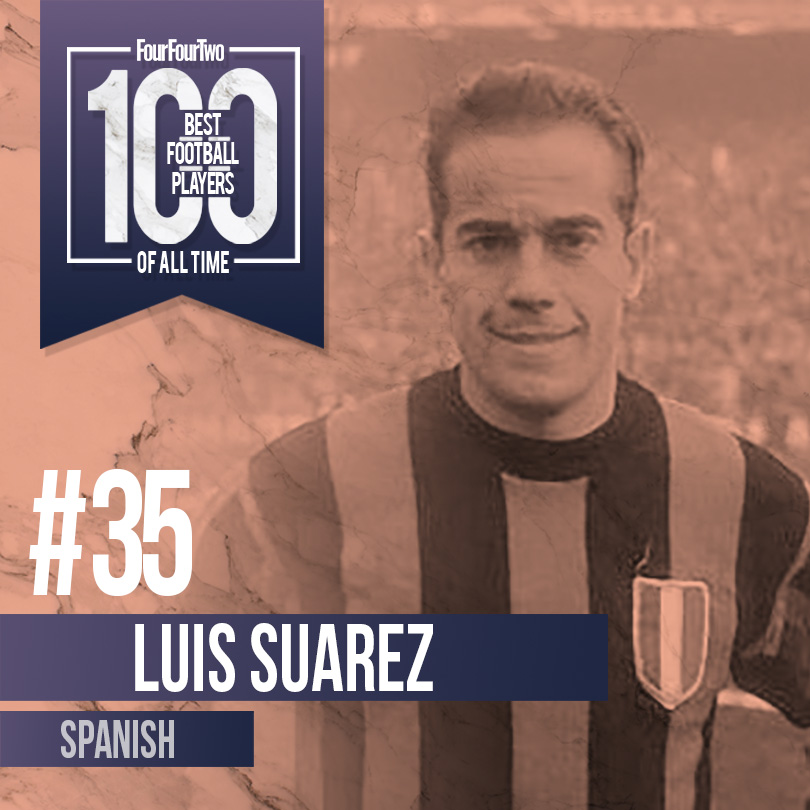
Why are they here?
No, not him. This Luis Suarez has never bitten anyone, for starters. Nicknamed ‘the Architect’, Suarez was a midfielder of rare vision and goalscoring touch who many still regard as the finest footballer Spain has produced. He remains the only Spaniard to win the Ballon d’Or, after guiding Barcelona to a Liga and Fairs Cup double in 1960.
Unfathomably booed by the Camp Nou for taking the place of Cule legend Ladislao Kubala, Suarez joined Inter for a world-record fee in 1961, reuniting with former Barça boss Helenio Herrera.
Herrera understood his playmaker-in-chief’s psyche intimately. Suarez believed that if wine were spilled in a team meal, he would score in his next game, so Herrera made sure to knock over his own glass before important matches. Suarez would dab his finger on the tablecloth, then touch his head and his foot.
Their partnership blossomed and it was at the San Siro where Suarez confirmed his legend, winning back-to-back European Cups in 1964 and 1965, plus Euro 64 with Spain.
Career highlight
In 1964, Suarez became the first Spaniard to win the European Cup and European Championship in the same summer. Juan Mata and Fernando Torres joined him in 2012.
Words: Andy Murray
34. Stanley Matthews
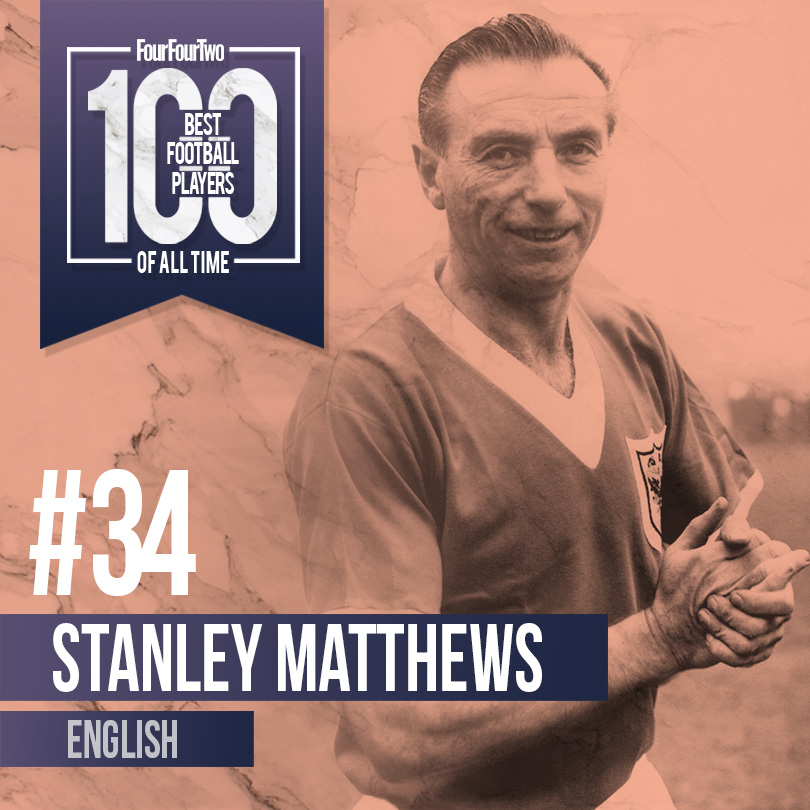
Why are they here?
‘The Wizard of Dribble’ remains arguably the most entertaining attacking player England has ever produced. Knighted for his services to the game, this remarkable physical specimen’s 30-year playing career encompassed 698 league appearances, featuring spells at Stoke either side of a 14-year stay at Blackpool.
He won the inaugural Ballon d’Or in 1956 and remains the oldest player to play top-division football in England, retiring at the age of 50 in 1965.
Career highlight
His full repertoire of feints and tricks were displayed in the 1953 ‘Coronation Cup Final’ at Wembley, when a trademark cross set up Bill Perry for a late winner in Blackpool’s 4-3 defeat of Bolton. That FA Cup was the only major team honour of Matthews’ career.
Words: Jon Spurling
33. Gunter Netzer
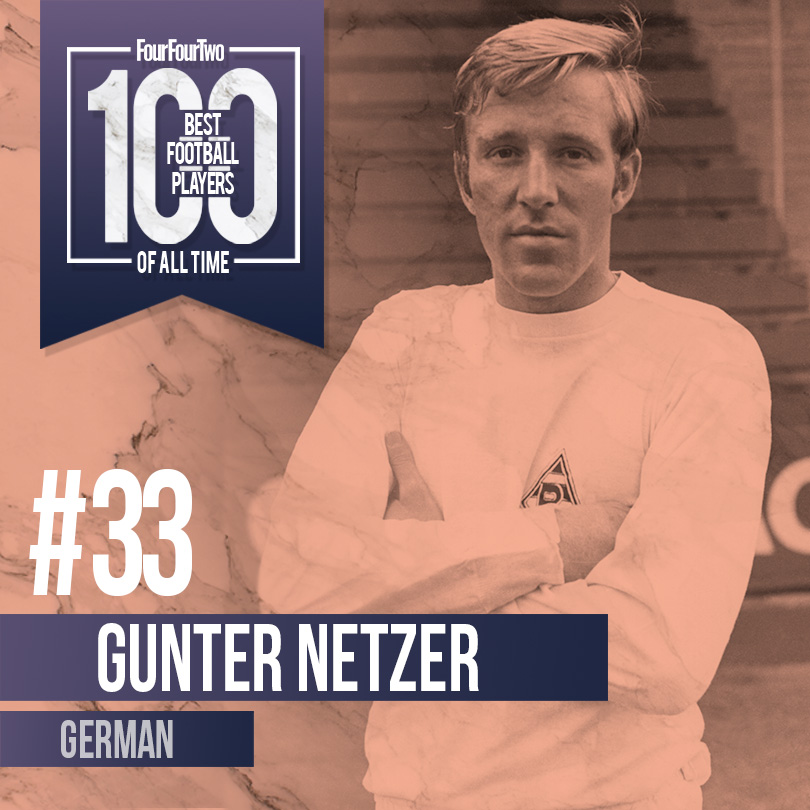
Why are they here?
An elegant playmaker, Netzer was one of the game’s best ever passers and seemingly able to put the ball on a spot from any distance. He was the ultimate leader of the brilliant Borussia Monchengladbach team that won two Bundesliga titles, and led them to UEFA Cup final – before he controversially left for Real Madrid in 1973 to lift two more league championship trophies.
That transfer damaged his chances with the national team, though, and Netzer was only used once as a substitute when West Germany won the World Cup in 1974.
Career highlight
Netzer was the star of the show as West Germany were crowned European champions in 1972, and was especially brilliant in the 3-1 win over England at Wembley. He finished second to Franz Beckenbauer in the Ballon d'Or ballot that year.
Words: Michael Yokhin
32. Paolo Rossi
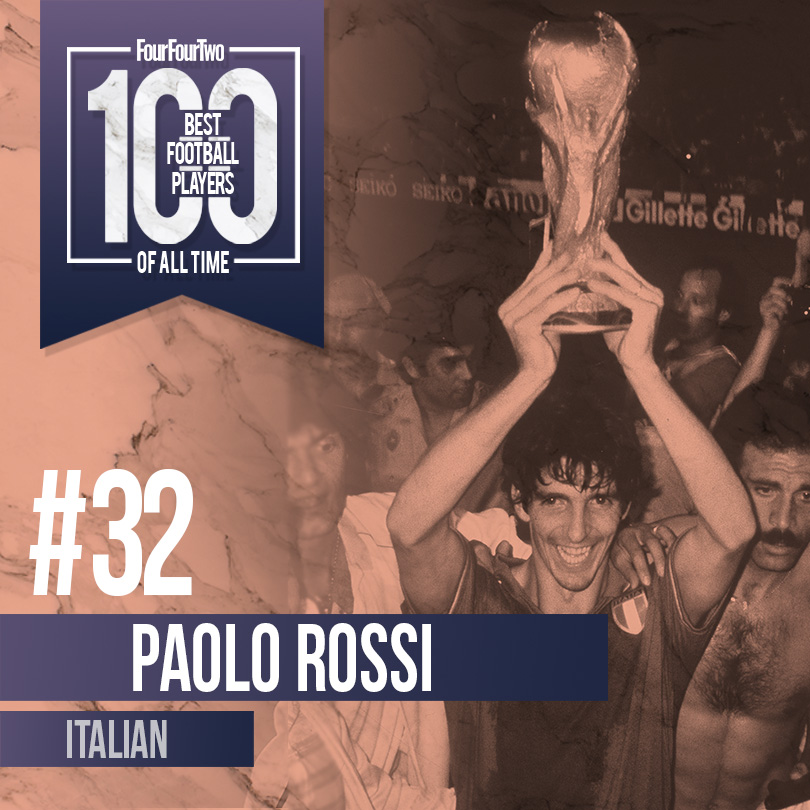
Why are they here?
Little Paolo, that most diminutive and slightly built of strikers, also possessed a ruthless and predatory edge which enabled him to lose his marker and ghost into the box unchallenged.
Rossi scored for fun at (mostly) unfashionable clubs including Perugia – where he became embroiled in a betting scandal – and Vicenza, before really making his mark with Juventus in Serie A and Italy at the 1982 World Cup. He finished that tournament as top scorer and was voted its best player.
Career highlight
Rossi's listless form in the early stages of the 1982 World Cup was eclipsed by his now-legendary hat-trick against favourites Brazil in the 3-2 win. Little wonder that his autobiography was entitled I Made Brazil Cry.
Words: Jon Spurling
31. Jose Manuel Moreno
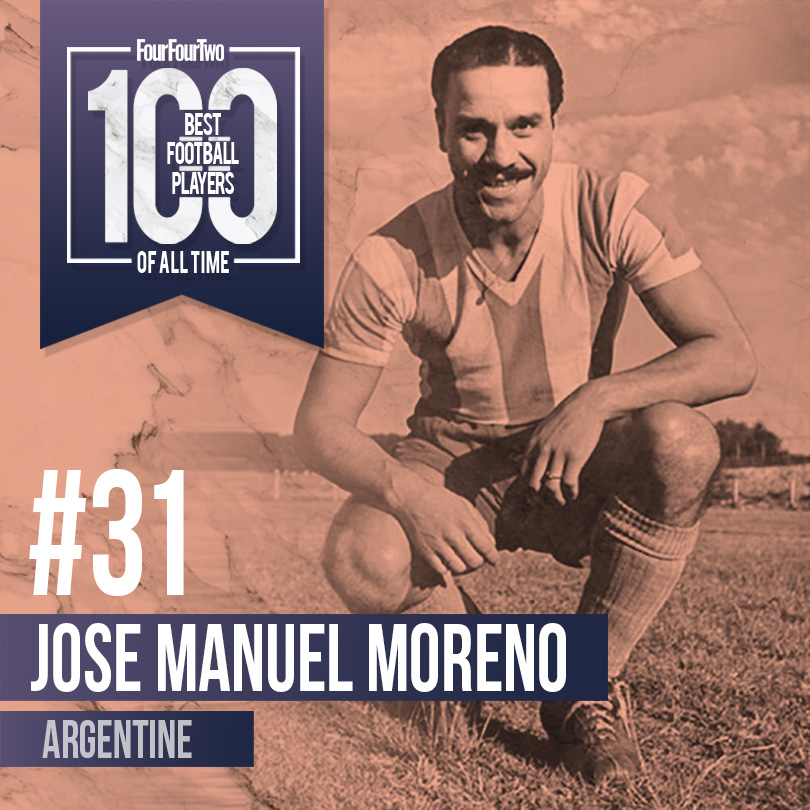
Why are they here?
A striker of incredible talent, Moreno was the lynchpin of the so-called La Maquina (The Machine), the great River Plate team of the 1940s that was hugely important to the tactical development of South American and world football. The team were the first to frequently exchange positions in attack.
Moreno seemingly had no weaknesses as a player, showing sublime technical skills, physical strength and vision to lead his team to six championship titles. Later on, he won league titles in Mexico, Chile and Colombia as well – becoming the first ever footballer to do so in four countries.
Career highlight
Moreno represented Argentina at four Copa America tournaments, leading them to two titles in 1941 and 1947.
Words: Michael Yokhin
The list
100 to 91 • 90 to 81 • 80 to 71 • 70 to 61 • 60 to 51 • 50 to 41 • 40 to 31 • 30 to 21
20 • 19 • 18 • 17 • 16 • 15 • 14 • 13 • 12 • 11 • 10 • 9 • 8 • 7 • 6 • 5 • 4 • 3 • 2 • 1
Alex Reid is a freelance journalist and the former digital features editor at FourFourTwo. He has also written for the Guardian, talkSPORT, Boxing News and Sport magazine. Like most Londoners, he is a lifelong supporter of Aberdeen FC. He is deceptively bad in the air for a big man. He has never been a cage fighter.
 Join The Club
Join The Club






